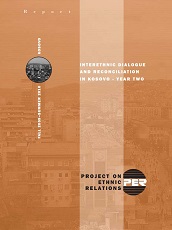Interethnic Dialogue and Reconciliation in Kosovo - Year Two
Interethnic Dialogue and Reconciliation in Kosovo - Year Two
Author(s): Livia Plaks
Subject(s): Constitutional Law, Inter-Ethnic Relations
Published by: PER Project on Ethnic Relations
Keywords: multi-ethnic Kosovo; interethnic dialogue in Kosovo; interethnic conflict in Kosovo;
Summary/Abstract: The activities carried out by PER in Kosovo between the summer of 2009 and the fall of 2010 were concentrated on helping to resolve specific, practical issues that the Serbian community encounters in everyday life in Kosovo with the purpose of improving the life of this community as well as improving interethnic relations in Kosovo. Issues such as how to deal with budgets and employment and how to bring more investments to a community, united Serbs and Albanians around the table preparing them to cope with the real challenges that need to be overcome. Another topic of importance in our work this past year was the effort to start a dialogue between Albanians and Serbs to help overcome and heal wounds that have been festering for many generations. Although it will take a considerable amount of time before there will be understanding and acceptance between the two communities, PER through its Forum for Dialogue has created one such venue for dialogue. The discussions have been very open and sincere on both sides. The open TV debates that followed some of the discussions with key representatives of the Albanian and Serb communities showed very clearly that interethnic dialogue can take place across the table even on some of the most sensitive topics. We judge that significant progress has been made in Kosovo south of the Ibar River in improving the living conditions of minority communities and advancing their political integration into Kosovo’s mainstream society. The local elections that took place in November 2009 resulted in expanded participation by the Serbs. The start of the process of decentralization which marked a significant change in access to power and influence at the community level, that is reflected in a more relaxed atmosphere in Kosovo and is visible in the interaction of Albanian and Serb politicians at all levels. With a number of municipalities now under the control of pragmatic mayors, mostly from the Serbian community, more decisions are made at the local level and this empowerment of the communities has helped to improve the situation in Kosovo.
Series: PER Reports
- Page Count: 32
- Publication Year: 2010
- Language: English
- Content File-PDF

